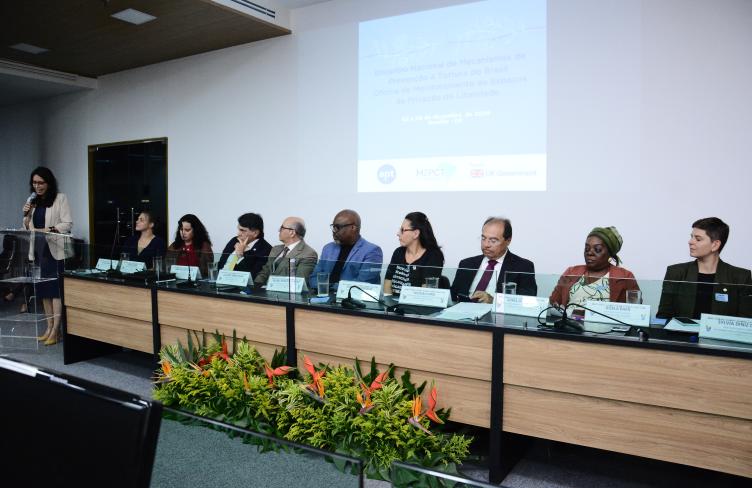
In a first-ever joint statement from Preventive Mechanisms, 19 torture prevention bodies from Latin America have urged the Brazilian Government to revoke a Presidential Decree that has stripped the country’s mechanism of the ability to carry out its mandate, putting at risk the lives and human rights of detainees. The Association for the Prevention of Torture joins this call.
In an important first, 19 National and Local Preventive Mechanisms from Latin America are making a joint stand to ensure their sister organisation in Brazil has the resources required to carry out its mandate.
The Brazilian Government issued a decree earlier in June that effectively dismantled the country’s preventive mechanism, hampering oversight into its prison system, well known to be rife with significant and deep-seated human rights violations.
“We cannot stress the importance of a fully functioning Brazilian preventive mechanism strongly enough for the protection of the rights and well-being of the country’s 800,000-plus detainees, nor the grave backward step for human rights that this Decree represents,” said Sylvia Dias, the Association for the Prevention of Torture’s country representative in Brazil. “That’s why we fully support the Latin American preventive mechanisms who have decided to take a stand in issuing this statement.”
The statement is available in full below.
The National and Local Preventive Mechanisms of Latin America make an urgent call to the Government of Brazil to guarantee the resources and full functioning of its National Preventive Mechanism
The undersigned National Preventive Mechanisms make clear their profound concern towards the actions of the Brazilian Government in Decree No 9.831, passed on 10 June, 2019, that eliminated the positions of the members of the National Preventive Mechanism, obstructing its ability to function effectively and carry out its mandate.
The Brazilian NPM, consisting of 11 members, was established by Federal Law No. 12.487 in 2013. Its mandate involves monitoring detention conditions through unannounced visits to all places where persons may be deprived of their liberty – including prisons, police stations and psychiatric hospitals. Its mandate also includes documentation of violations and provision of recommendations to the public authorities, with a view to achieving structural changes in law, policies and practices in order to reduce the risks of torture and other ill-treatment and strengthen the protection of the rights of persons deprived of their liberty.
The creation of the NPM results from the international obligation the Brazilian State assumed when it ratified the Optional Protocol to the United Nations Convention against Torture (OPCAT) in 2007. According to that international treaty, Brazil undertook to create the NPM and provide it with the material and human resources necessary for it to carry out its mandate, while also guaranteeing its functional and operational autonomy.
Persons deprived of their liberty are in a situation of special vulnerability and at a higher risk of suffering torture and ill-treatment, due to their life behind bars, and from the total control of the State regarding the exercise of their rights. Therefore, places of deprivation of liberty must be subject to external scrutiny and independent and strict supervision. In this sense, the National and Local Mechanisms for the Prevention of Torture play a fundamental role, even more so in a country like Brazil that has the third largest number of people in prison worldwide - with approximately 812,000 people imprisoned - and where inhuman and degrading conditions of detention prevail, characterised by severe overcrowding and widespread violence.
Since the beginning of its work in 2015, the Brazilian NPM conducted monitoring visits to more than 170 detention centers – including penal centers, psychiatric hospitals, therapeutic communities, adolescent detention centers, and police stations – across 20 states of Brazil, and issued around 2,077 recommendations to public authorities. Hindering the work of the NPM and depriving it of its material and human resources constitutes a serious setback, which makes a public policy already implemented in the country fragile and makes it impossible for the NPM to continue complying with its powers set forth in national law and the international OPCAT treaty. The measures adopted by the Brazilian government are unprecedented, not only in Latin America, but throughout the world, and places Brazil at fault with the international community.
In this regard, the undersigned National and Local Prevention Mechanisms of Latin America deeply regret the decision taken by the Federal Executive Power of Brazil. This decision undermines the protection of the rights of persons deprived of liberty in the country. The undersigned stand in solidarity with the members of the National Prevention Mechanism of Brazil in front of the serious obstacles they face in carrying out their legal mandate, and urge the Brazilian authorities to reverse the measure that eliminated the charges of this human rights protection body, respecting the commitments they assumed through international treaties.
- Comité Nacional para la Prevención de la Tortura y Otros Tratos o Penas Crueles, Inhumanos o Degradantes (CNPT) de Argentina
- Servicio para la Prevención de la Tortura (SEPRET), Mecanismo Nacional de Prevención de Bolivia
- Mecanismo Nacional de Prevención de la Tortura de Costa Rica
- Mecanismo de Prevención de la Tortura y Tratos Crueles y Degradantes de Ecuador
- Mecanismo Nacional de Prevención de la Tortura de Guatemala 6) Comité Nacional de Prevención Contra la Tortura y Otros Tratos Crueles, Inhumanos y Degradantes (MNP-CONAPREV) de Honduras
- Mecanismo Nacional de Prevención de la Tortura de México
- Mecanismo Nacional Para la Prevención de la Tortura de Panamá
- Mecanismo Nacional de Prevención de la Tortura (MNP) de Paraguay
- Mecanismo Nacional de Prevención de la Tortura de Perú
- Mecanismo Nacional de Prevención de la Tortura de Uruguay
- Mecanismo para la Prevención de la Tortura de la Ciudad Autónoma de Buenos Aires, Argentina
- Comisión Provincial de Prevención de la Tortura de la Provincia de Mendoza, Argentina
- Comisión Provincial de Prevención de la Tortura (CPPT) de la Provincia de Misiones, Argentina
- Comité Provincial para la Prevención de la Tortura y Otros Tratos o Penas Crueles, Inhumanos o Degradantes de la Provincia de Salta, Argentina
- Mecanismo Estadual de Prevenção e Combate à Tortura do Estado da Paraíba, Brasil
- Mecanismo Estadual de Prevenção e Combate à Tortura do Estado de Pernambuco, Brasil
- Mecanismo Estadual de Prevenção e Combate à Tortura do Estado do Rio de Janeiro, Brasil
- Mecanismo Estadual de Prevenção e Combate à Tortura do Estado de Rondônia, Brasil
For further information, please contact Sylvia Dias, Representative of the APT in Brasil: sdias@apt.ch + 55 21 98145 4650


